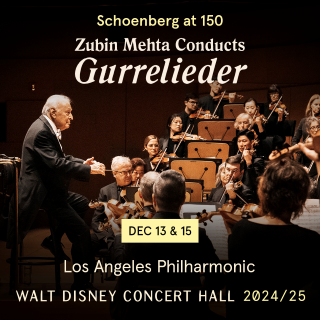In an era when orchestral programming often shies from excess, the Los Angeles Philharmonic last weekend plunged unapologetically into the extravagant labyrinth of Arnold Schoenberg’s Gurrelieder. Under the baton of Zubin Mehta—paying homage to his tenure as the orchestra’s lionized music director emeritus—the performance resuscitated Schoenberg’s early, sprawling epic, a two-hour monument to the late-Romantic ethos he would soon abandon for the asceticism of atonality.
Zubin Mehta
Mehta, who first led Gurrelieder in Los Angeles in 1968, returned to the work with characteristic devotion, although the results were uneven. Written over a decade, from 1901 to 1911, Gurrelieder is a protean hybrid: symphonic tone poem, choral epic, and quasi-operatic drama, unfurling on a scale that rivals Wagner’s grandest imaginings. Its narrative—a fever dream of love, death, and spectral resurrection—stretches Schoenberg’s late-Romantic idiom to the brink of implosion, yielding a piece that is as much spectacle as music.
Christine Goerke and John Matthew Myers
The plot, drawn from Jens Peter Jacobsen’s poem cycle, unfolds as a tale of doomed love between Waldemar, King of Denmark, and his beloved Tove. Their passion is shattered by the jealous wrath of Waldemar’s queen, who arranges Tove’s murder. Devastated, Waldemar curses God, a blasphemous act that binds him and his vassals to an eternity of spectral wandering. In a nightmarish climax, the undead legions rise in a frenzy, their torment assuaged only by the balm of dawn, heralding cosmic transcendence and a return to the natural order.
The forces marshaled for this rare undertaking were staggering: an orchestra of 150, a chorus of 100, five vocal soloists, a narrator, and an arsenal of horns, flutes, harps (four), and bassoons sufficient to populate an orchestral fantasy. Walt Disney Concert Hall quivered under their collective might, producing sounds at once ravishing and terrifying. The lush harmonies of Gurrelieder—twilight birdsong, echoes of Wagnerian chromaticism, the spectral glow of harp and low winds—were rendered with sensitivity, though Mehta’s sometimes excruciatingly slow pacing robbed the score of its volatile momentum. Moments that should have flared with raw energy instead lingered, luminous but static.
The LA Phil, Los Angeles Master Chorale, and soloists
The vocal performances were similarly mixed. John Matthew Myers, stepping in as Waldemar for an indisposed Brandon Jovanovich, struggled to assert his tenor against Schoenberg’s dense orchestration, his voice retreating when it should have soared. Christine Goerke, by contrast, brought formidable Wagnerian heft to Tove, anchoring the lovers’ doomed romance with grandeur and passion. Violeta Urmana, in the role of the Wood Dove, offered the evening’s standout vocal performance, her darkly burnished mezzo tracing Tove’s death and Waldemar’s grief with aching precision.
Members of the Los Angeles Master Chorale
Dietrich Henschel, in the role of the narrator, delivered a commanding spoken performance, his voice a cipher for Schoenberg’s fragmented, late-modernist vision. Gerhard Siegel’s acerbic turn as Klaus-Narr cut through the orchestra with mordant glee, while Gabriel Manro proved a steady if unremarkable presence as the peasant. The Los Angeles Master Chorale emerged as a star unto itself: the men’s voices, embodying the spectral vassals of Gurre, achieved a translucent, otherworldly sonority that was one of the evening’s enduring pleasures.
Zubin Mehta
If this Gurrelieder fell short of transcendence, it nevertheless reaffirmed the work’s status as a singular artifact of Romanticism’s dying gasp—a rare and grotesque orchid that blooms but once in a generation. Even in imperfection, the Philharmonic’s effort was a testament to the institution’s willingness to embrace the audacious and the unwieldy, presenting a piece that Schoenberg himself might have regarded with ambivalence but which remains an indelible chapter in the history of musical excess.
photographs taken by Timothy Norris
at the Walt Disney Concert Hall,provided courtesy of the Los Angeles Philharmonic Association

